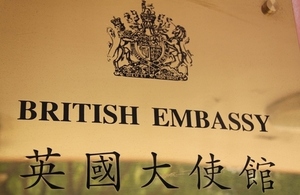UK and China launch clean coal workshops
The British Embassy in Beijing and the International Energy Agency Clean Coal Centre jointly launch two workshops this week.

UK and China launch clean coal workshops
The workshops are held in Jinan and Shijiazhuang, capital cities of two of China’s major coal consuming provinces, to help cut emissions from coal-fired power plants and industrial boilers, a major contributor to air pollution choking the regions.
With financial support from the UK Foreign and Commonwealth Office via its Strategic Programme Fund for China, the International Energy Agency (IEA) Clean Coal Centre is working with Tsinghua University, the Electric Power Planning and Engineering Institute and local foreign affairs offices.
Two workshops on 13 January and 15 January in Jinan and Shijiazhuang respectively will provide technical advice to local policy makers and industrial stakeholders. To facilitate capacity building efforts, the IEA Clean Coal Centre is today launching a Chinese language version of its website to offer a wide range of clean coal study profiles covering power, cement, coking and chemicals. These make available to officials and industry specialists across China up-to-date information on the latest international clean coal best practice, techniques and technologies.
Mr Mark Gooding, Political Counsellor in the British Embassy, Beijing said:
In June last year, our two governments agreed that ‘energy collaboration was a key pillar of the bilateral relationship.’ This recognises the partnership we have established as China undergoes an energy revolution and the UK pushes towards its ambitious carbon reduction targets.
We are pleased to be supporting this week’s initiative in Hebei and Shandong Provinces as a way to provide practical and technical support with the goal of lowering coal-related emissions in two provinces where coal dominates the energy supply.
Dr Andrew Minchener OBE, General Manager of IEA Clean Coal Centre, said:
Our remit includes supporting and promoting clean coal utilisation. Ultimately that should be high efficiency coal use combined with Carbon Capture and Storage (CCS).
At the same time, as China, the UK, and other countries, work towards widespread deployment of CCS, we are keen to work with Chinese partners to ascertain what intermediate steps can be taken, especially to improve air quality and greenhouse gas emissions while improving the efficiency of coal use.
In 2011, Shandong was the largest coal consuming province (380 million tons), accounting for 1/10 of national coal consumption and 1/20 of global consumption. Over the last decade coal consumption continued to rise by an average of 7.5% per year. The province also topped the list of provincial sulphur dioxide and nitrogen oxide emitters in 2012.
In Hebei the reliance on coal is even greater with figures showing that almost 90% (271 million tons) of the province’s energy is coal generated. Hebei is also home to seven of the top ten most polluted cities in China.
Even with the Chinese Government’s plans to move to a less carbon intensive economy, coal will continue to play an important role in China’s energy mix. The continued use of coal, especially for power generation but also in numerous relatively small industrial boilers, has contributed to severe air pollution problems, especially in urban areas. Driving up the efficiency of coal and using technology to limit harmful emissions is, therefore, an important interim step before the deployment of CCS technology.
Improvements in coal efficiency and reductions in emissions will only become a reality when provincial governments have the policies, tools and technologies to implement new more stringent national directives on emissions. Through this project, the two provincial governments can establish the potential advantages of introducing cost effective clean coal technologies, policies and investment frameworks as part of an overall transition towards a diverse energy mix that will include natural gas and renewables. The UK and China are working in close partnership in support of China’s Energy Revolution including on CCS, Offshore Wind, other renewables and gas. This project is just one of more than 50 that the British Embassy is currently funding to support transition to a more diversified energy mix as part of a low carbon economy.